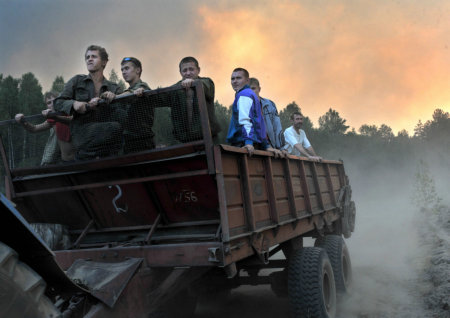Russia: Fires near Chernobyl 'not dangerous'
A two-hectare peat bog fire is burning 60 kilometers south of Chernobyl, the site of the world's worst nuclear disaster, but the situation poses no danger, a Ukrainian official said Thursday.
 |
|
Russian volunteers ride on a trailer Thursday as they prepare to fight a fire at a forest near the village of Tokhushevo, some 50 kilometers outside Sarov. [Photo: Xinhua via Global Times/AFP] |
The fire started Monday and will be extinguished today or even earlier, said Viktoria Ruban, spokeswoman for Ukraine's Ministry of Emergency Situations.
However, an Al Jazeera story quoted experts as saying that topsoil in nuclear-polluted areas holds radioactive particles that could be thrown into the air by wildfires.
Although officials claimed that no radioactive particles had spread, many Russians are taking the official response with a pinch of salt, Al Jazeera reported, adding that Russian firefighters had quickly extinguished blazes in the Bryansk region, one of the areas worst affected by the Chernobyl fallout.
Russian President Dmitry Medvedev said Thursday that Moscow had stepped up efforts to halt wildfires near main nuclear research sites, and he warned that many farms were on the verge of bankruptcy as one quarter of the country's crops have been lost due to the disaster.
"We have a very complicated situation because, as a whole in the country, around a quarter of the grain crops have been burned," Russian news agencies quoted the president as saying in the southern town of Taganrog. "Unfortunately, many farms are on the verge of bankruptcy on account of the death of the harvest."
Medvedev also said he had lifted the state of emergency in the Vladimir, Voronezh and Marii El regions, while the situation remained complicated in another four - Mordovia, Moscow, Nizhny Novgorod and Ryazan.
Moscow dispatched a special firefighting train and 70 more people to join over 3,400 firefighters battling to douse wildfires close to its top nuclear research center in Sarov, a town in the Nizhny Novgorod region still closed to foreigners, as in Soviet times.
However, a new wildfire caused by lightning flamed up near the Sarov nuclear center.
Meanwhile, although Moscow has choked for days on acrid smog that seeped into apartments, offices and even underground into the metro, all embassies representing EU countries have resumed their operations, the Moscow Times reported.
The city's air was clear of smog Thursday as authorities said the total area of the wildfires in the Moscow region has been reduced by more than a quarter to 1.26 square kilometers over the past 24 hours, as firefighting teams poured more than 1,000 tons of water over burning fires and peat bogs.
 0
0 







Go to Forum >>0 Comments